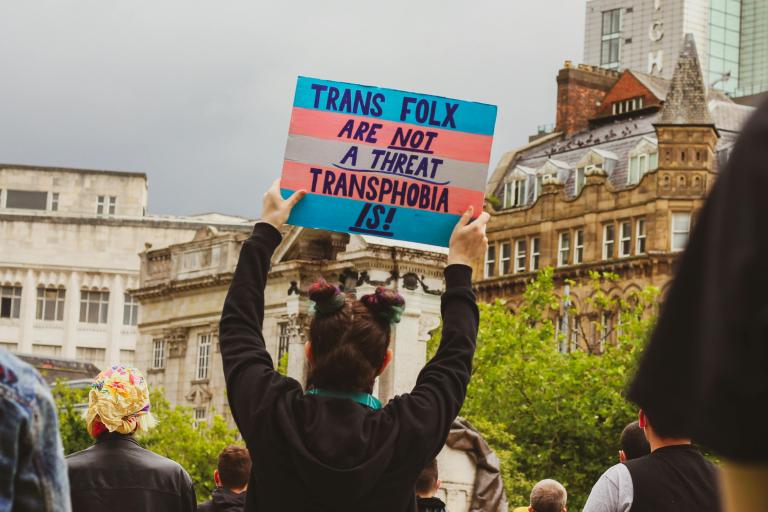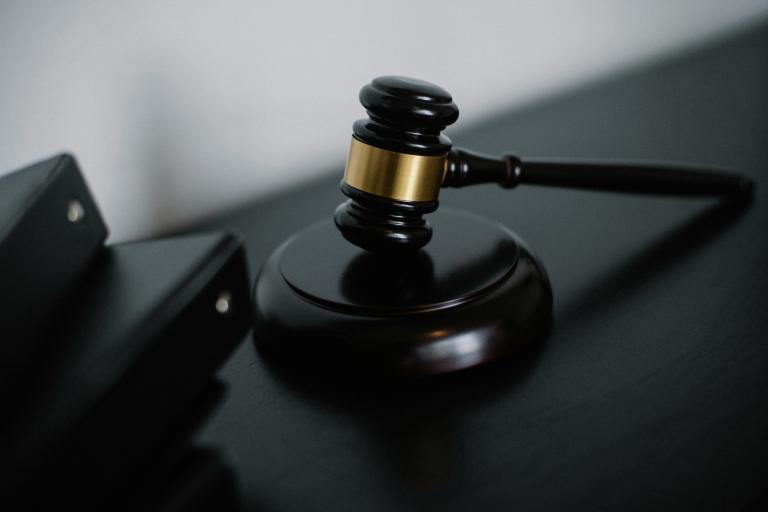
Insights
Equating Respect for Trans People With Terrorism Is as Dangerous as It Is Absurd
Region(s)
TOPIC(s)
Type
Commentary
Author(s)
Publish Date
October 6, 2025
Share
Two far-right groups close to the Trump administration, the Heritage Foundation and its spin-off organization the Oversight Project, have launched an online campaign urging the Federal Bureau of Investigation (FBI) to create a new category of domestic terror threat: “Transgender Ideology-Inspired Violent Extremism” (TIVE). The online campaign describes “TIVE” as “the belief that violence is justified against those who do not share radical views of transgender ideology.” A memo posted by the organizers on X goes further to impugn, as a potential form of “terrorism,” the well-documented argument that denial of trans people’s existence can contribute to self-harm and suicide.
The campaign claims that “TIVE has played a role in the majority of mass shootings at schools,” in flagrant disregard for statistics demonstrating that the common thread underlying most school shootings and other mass shootings is that they are committed by cisgender men. By framing trans advocacy as a potential source of domestic terrorism, the proposal risks turning constitutionally protected speech into grounds for surveillance and criminalization.

This campaign, both preposterous and harmful, should not be seen in isolation. An unprecedented wave of attacks on the rights of trans, nonbinary, and intersex people in the United States has marked the year 2025. From his first day in office, President Trump used the power of the executive branch to erase recognition of gender diversity, eliminate DEI programs, ban trans people from military service, and prohibit schools from respecting students’ gender identity. By mid-September, 28 U.S. states had enacted 122 anti-trans bills, ranging from bathroom restrictions and sports bans to gag orders for teachers and sweeping definitions of sex that erase gender diversity from state law. Together, these federal and state measures have created a climate of fear and moral panic — precisely the environment in which proposals like the Heritage Foundation’s, detached from any evidence base and motivated by hatred, can flourish and gain public legitimacy.
The Heritage Foundation has gained notoriety as the key architect of Project 2025, the far-right authoritarian blueprint that is guiding much of the Trump administration’s policymaking. While the petition is not government policy, it is a dangerous attempt by a powerful actor to shift transgender advocacy from the sphere of civil rights into the realm of national security. The petition frames respect for the dignity of trans people as a pervasive domestic terror threat and seeks to persuade the FBI to treat an entire category of activism as a security risk.
Such framing risks collapsing the distinction between violent extremism and constitutionally protected dissent. Were the FBI to adopt such a designation, it could activate a full arsenal of surveillance and intelligence tools against transgender people and organizations — including network mapping, informant infiltration, and watchlisting. This proposal strikes at the core of rights guaranteed by the U.S. Constitution: freedom of expression, freedom of association, and equal protection under the law. Advocacy for one’s own existence — even if it challenges state policies — is not terrorism. Treating it as such would criminalize dissent and erode the foundations of a pluralistic democracy.
The danger of this framing has only grown in light of President Trump’s September 25 memorandum on “Countering Domestic Terrorism and Organized Political Violence.” The order directs the Department of Justice and Joint Terrorism Task Forces to investigate and dismantle entire networks deemed to be engaged in “political violence,” including organizations and funders, and authorizes the Attorney General to recommend that such groups be designated as “domestic terrorist organizations.” In a context where trans advocacy is being falsely portrayed as a source of extremism, these sweeping powers risk being weaponized against civil society groups and advocates, further suppressing speech and eroding the right to organize.
Russia offers a chilling precedent. The campaign against LGBTIQ people escalated step by step: in 2015, Vladimir Putin’s government adopted the “undesirable organizations” law, allowing authorities to ban non-governmental organizations on vague grounds of threatening “public order” or “national security.” This measure was followed by years of selective censorship, the branding of human rights groups as “foreign agents,” and the systematic isolation of Russian civil society.
In November 2023, the repression reached a new peak when the Russian Supreme Court declared the “international LGBT movement” an extremist organization, effectively making any public expression of LGBT identity or support for LGBT people illegal. Since then, police have raided bars, shut down community spaces, and prosecuted individuals for posting Pride flags or sharing queer content online. Far from being neutral lawmaking, these measures were part of a deliberate strategy to consolidate power, silence independent voices ahead of elections, and erase queer and trans life from public space.
Russia is not alone in using the law to restrict entire communities. In China, since at least 2014, the government has targeted the Uyghur Muslim population with mass arbitrary detentions, “re-education” camps, and sweeping restrictions on religious and cultural expression, framing these measures as part of a counterterrorism effort. In Saudi Arabia, the 2014 counterterrorism law explicitly equates the public promotion of atheist ideas with terrorism, effectively criminalizing the expression or advocacy of disbelief. And in Nicaragua, where Daniel Ortega has consolidated power into an outright dictatorship, the 2020 “foreign agents” law and other broadly worded statutes have been used to shut down hundreds of NGOs, confiscate property, and imprison political opponents, effectively dismantling independent civil society. These examples reveal a common authoritarian pattern: turning identities and ideas into security threats as a way to legitimize surveillance, arrests, and the suppression of dissent.
The Oversight Project and the Heritage Foundation’s call for a new terror label serves a similar function: by portraying trans-led organizations as extremists, it provides a pretext to monitor, harass, and defund them. What began in Russia as “foreign agent” and “undesirable” designations eventually eliminated nearly all independent LGBTIQ groups. The United States must not follow this authoritarian path.
American history also warns us about the dangers of weaponizing state power against dissent. During the McCarthy era of the 1950s, the government conducted loyalty investigations, blacklisted individuals, and ruined careers based on accusations of communist sympathies. The same playbook — conflating belief with disloyalty — now risks being repurposed against those defending trans people’s rights.

Finally, the claim that trans people or progressive groups that defends their rights pose a unique security risk is refuted by the data. According to the Center for Strategic and International Studies, far-right extremists have been responsible for the vast majority of politically motivated killings in the United States in recent years. If the Heritage Foundation’s logic were applied consistently, domestic counterterrorism efforts would focus on the violent ideologies driving these attacks — and on the demographic groups most frequently involved, who are overwhelmingly cisgender men. Of course, no one is advocating for such profiling; the point is that punishing an entire community for the actions of a few is both unjust and dangerously authoritarian. Americans and the global community should reject wholesale this attack on fundamental freedoms.
At Outright International, we are unequivocal: this campaign is part of a broader authoritarian strategy to roll back human rights and silence those who defend them. Preventing the normalization of “transgender terrorism” language is critical. If this framing takes hold, the space for advocacy — not just for LGBTIQ rights but for all human rights — will shrink dramatically.
Defending democracy means defending the right of transgender people — and all marginalized groups — to speak, organize, and advocate without being treated as enemies of the state.

Take Action
When you support our research, you support a growing global movement and celebrate LGBTIQ lives everywhere.
Donate Now